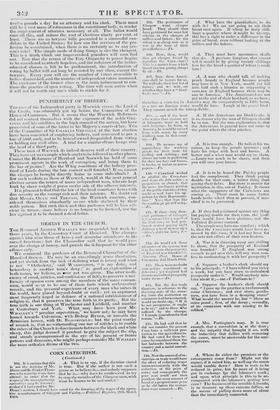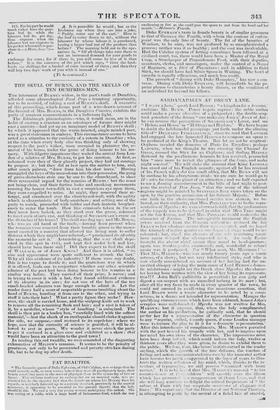CORN CATECHISM. (Continued.)
104. It is curious that this is not the doctrine of Mr. A. That is to say, if the doctrine stated is true. But if the author is not such a goose as to believe it,—and nobody supposes that he is,—why does he condescend to try to stop the mouths of the Glasgow men, with what he knows to be unfounded ? I bread. They should then ! have petitioned for some law relative to the charge:* of millers and bakers ; for the wheat is as cheap now as it was in the time of their grandfathers.—lb.
106. How, then, would they get cheaper breed by repealing the Corn - laws? This is a matter from which theseCortelaw gentry always fly olf.—lb.
107. Now, these Ameri- cans shall he tasters for us. We will take their last list of duties ; and We will see whether they have a " luta- lord's Mr."— I b. A. What have the grandfathers.; to do with it ? We are not going to eat their bread over again. If wheat be forty shil- lings a quarter where it might be twenty, this has a right to make a difference in the price of bread, even without looking at the millers and the bakers.
A. They must have uncommon skulls that do. A precious lawgiver, that cannot tell it would be by giving twenty shillings less for the bread a quarter of wheat is made into !
A. A man who should talk of making peach brandy in England because people may have it at New York, would not fall into half such a blunder as supporting a corn-tax in England because there may be one in America. The Americans have not got to the end of their best land, as we have ; therefore a corn-tax in America may do comparatively as little harm, as a tax on foreign water would do here. Laugh at the yams-bred ! They cannot match the turnip-fields.
104. — and if the beast v.ilo writes thus against nue at Glasgow, were to hold such language, he being in America, he would be turned hunt istir scorn, by every ‘vorkimr-man in that min- try.— b.
100. Ite accuses me of reproaching the working people for their taste for routing and writing ; and abuses toy taste in preferring for their use beer and bacon, to hooks, or rather to news- papers.—/b.
110. " Crawford wished to abolish Me Corn-laws owl leave the debt entire ; a proposition so absurd, that the more intelligent portion of the public considered they might as well have his op- ponent lot their Representa- tive." Yes ; that was like tIv •ensible ;lel& of Paisley.
If these sixty thou- sand petitioners of Glasgow Iii petitioned for a repeal of the .1lalt- tax ; or had peti- ti.nred against paying eight shillings a wick to rear tip a ,oirliet.'s child for him ; if- -- lb.
112. Ile woull ask those advocates of the system, was it in free trade the prosperity of England was founded:— Jim-a/ay nous: of Curriniolis. 22.1 March 1634.
11:3. These were nu doubt now-a-days crorsiderell as defective ; yet England hid risen to undoubted prosperity under thent.—./b.
114. Bra the free trade theorists, in reference to the
decaying state of the coun- try since the restriction on commerce had been removed, would no doubt say, " If it be not prosperous, it ought to be so;" and to those who suffered by the change, " Console yourselves for that reason. "lb.
115. He had said that lie did not consider the present Corn lawsa taillicient pro- tection to the agr iculturists. He laud voted for them be- cause he considered them the last bulwarks between the country and a social convul- sion:I.—lb.
116. Now the removal of re- striction on trade would have tile effect of reducing wages incommensurately with the reduction of the price of corn ; and consequently the poor man could not then purchase the same amount of !mead at a proportionate pi ice as he did before the restric- tions were removed.—Ib. A. If the Americans are blockheads, it is no reason why the men of Glasgow should be so too. But the true explanation is, that the Americans in general have not come to the point where the shoe pinches.
A. It is true enough. He toils in his vo- cation, to keep the people ignorant ; and baits his traps with beer and bacon. A better and a wiser man would say to them, —Learn too much to be slaves, and then you will save your bacon.
A. It is to be hoped the Paisley people feel the compliment. They think paying double for their corn, a better thing than paying their debts. But there is matter for meditation in this, out of Paisley. It shows what the supporters of the Corn-laws are aiming at. There must be some Letter hands to the wheel than at present, if mis- chief is to be prevented.
A. If they bad petitioned against any thing but paying double for their corn, the land- lords would have been glorious, and the Political Register content.
The people may have one comfort ; which is, that the Corn- laws would have been re- moved by this time, if it had not been for the acts and efforts of their own leaders.
A. Was it in throwing away one shrilling iii three, that the prosperity of lingkuld was founded? If England was strong enough to get over this, will any man con- fess to confounding it with her prosperity?
A.. Suppose a banker's clerk should say to his principals, " I have robbed you twice a week, but you have risen to undoubted prosperity under it." Would anybody mis- take about it;—out of Parliament ?
A. Suppose the banker's clerk should say, " I gave up the practice a twelvemonth come Christmas ; and ever since, gentle- men, you have been in a decaying state" What would the answer be, but " Show us some proof ; first, of the decay ; secondly, of its connexion with our ceasing to be robbed."
A. Mrs. Partington's mop. It is true enough, that a convulsion is at the door ; and the iniquity that brought it on, with the imbecility that dallies with removing the cause, must be answerable for the con- sequences.
A. Where do either the premises or the consequence come from? Might not the arguer, if it suited him, as well say the moon would tumble down ? How is corn to be reduced in price, but by more of it being got in exchange fps the labourer's work ; and upon what principle is this to be ac- companied with the labourer's getting less corn ? The business of the sensible Liberals, is to treasure up these extreme follies, as the means of pulling down more of abuse than the immediately connected. 117. For his part he would much rather have the guar- tern loaf 2.3. while the labourer had 6s. per day, than sixpence when the labourer had not sixpence in his pocket wherewith to pur- chase it.—(Hear, bear !)—
(To be continued.)





















 Previous page
Previous page